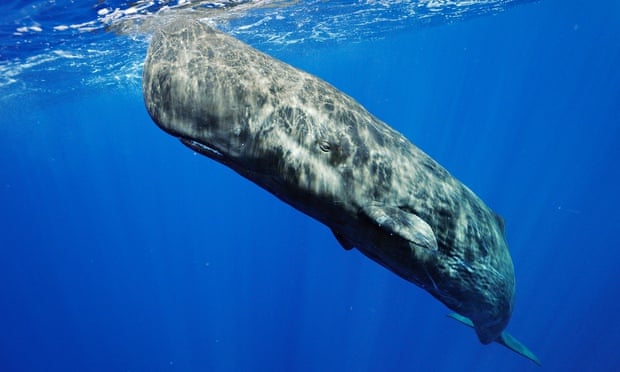Do cetaceans have a sense of right and wrong? Yes. And religion? Perhaps

On my last visit to the Azores – those black volcanic islands set adrift in the middle of the Atlantic – the underwater photographer Andrew Sutton and I watched a pod of sperm whales at play. Six or seven animals – it was sometimes difficult to say how many there were – spent hours rolling around one another in what biologists call a “socially active group”. Their ebony black or dove grey bodies were in contact throughout. Fins stroked flanks, gentle jaws bit one another. At one point, two of the whales brought their pugnacious, square foreheads together in what looked like an act of philosophical communion. We were not only watching the world’s biggest predators, but also the animals with the largest brains, communicating with one another in the most intense, sensual manner.
Hal Whitehead and Luke Rendell have been studying sperm whales, and other cetaceans, for a combined total of 50 years; Whitehead’s last book, Sperm Whales: Social Evolution in the Ocean, has been a bible for my own investigations into these enigmatic animals. Zoned-out freaks of the 1960s generation saw these marine mammals as aliens; now it’s time to ask serious questions. Do cetaceans have a culture? Can a non-human culture exist? And if so, how does that change our responsibility towards other species?
Modern whale science is a recent discipline. It only really began with that psychic shift in the late 60s. Until then, whales had been a locus of fearful wonder, or an industrial resource. That changed when the young scientists Roger Payne and Scott McVay lowered their hydrophones into the ocean and recorded the song of the humpback whale. In an instant, an animal hitherto regarded as dumb, and unable to protest its abuse, acquired a voice capable of delivering a melodious, fluid, abstract threnody. It was a 2001 moment. We realised our error, and our insignificance. Payne’s recording, Songs of the Humpback Whale, made the album charts in 1970. As it established its culture, the whale invaded ours.
More
Hal Whitehead and Luke Rendell have been studying sperm whales, and other cetaceans, for a combined total of 50 years; Whitehead’s last book, Sperm Whales: Social Evolution in the Ocean, has been a bible for my own investigations into these enigmatic animals. Zoned-out freaks of the 1960s generation saw these marine mammals as aliens; now it’s time to ask serious questions. Do cetaceans have a culture? Can a non-human culture exist? And if so, how does that change our responsibility towards other species?
Modern whale science is a recent discipline. It only really began with that psychic shift in the late 60s. Until then, whales had been a locus of fearful wonder, or an industrial resource. That changed when the young scientists Roger Payne and Scott McVay lowered their hydrophones into the ocean and recorded the song of the humpback whale. In an instant, an animal hitherto regarded as dumb, and unable to protest its abuse, acquired a voice capable of delivering a melodious, fluid, abstract threnody. It was a 2001 moment. We realised our error, and our insignificance. Payne’s recording, Songs of the Humpback Whale, made the album charts in 1970. As it established its culture, the whale invaded ours.
More
No comments:
Post a Comment